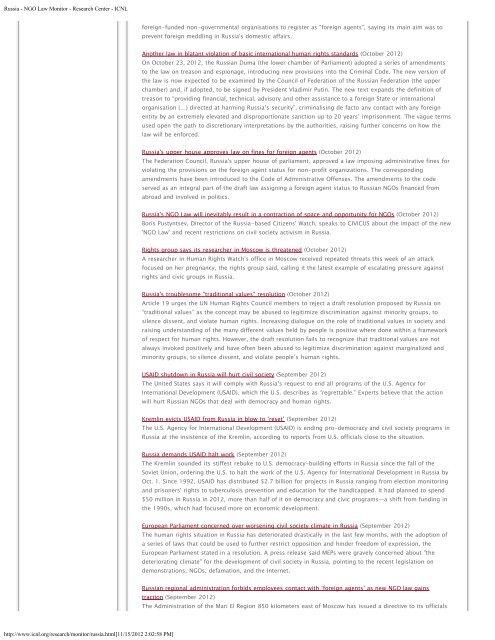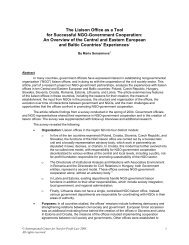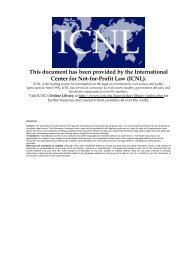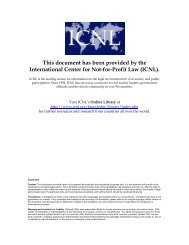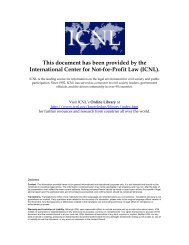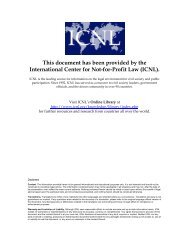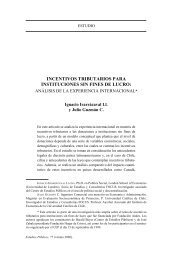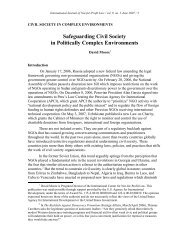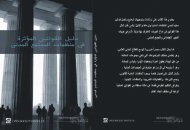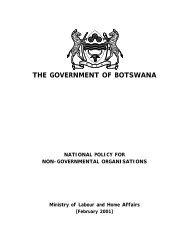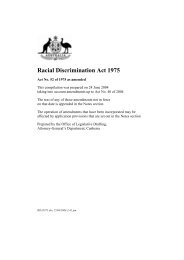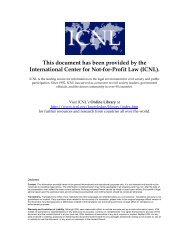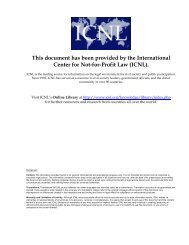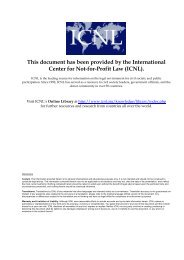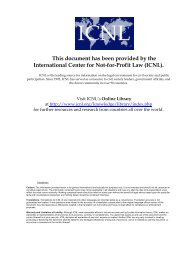Russia - NGO Law Monitor - Research Center - ICNL
Russia - NGO Law Monitor - Research Center - ICNL
Russia - NGO Law Monitor - Research Center - ICNL
Create successful ePaper yourself
Turn your PDF publications into a flip-book with our unique Google optimized e-Paper software.
<strong>Russia</strong> - <strong>NGO</strong> <strong>Law</strong> <strong>Monitor</strong> - <strong>Research</strong> <strong>Center</strong> - <strong>ICNL</strong><br />
http://www.icnl.org/research/monitor/russia.html[11/15/2012 2:02:58 PM]<br />
foreign-funded non-governmental organisations to register as "foreign agents", saying its main aim was to<br />
prevent foreign meddling in <strong>Russia</strong>'s domestic affairs.<br />
Another law in blatant violation of basic international human rights standards (October 2012)<br />
On October 23, 2012, the <strong>Russia</strong>n Duma (the lower chamber of Parliament) adopted a series of amendments<br />
to the law on treason and espionage, introducing new provisions into the Criminal Code. The new version of<br />
the law is now expected to be examined by the Council of Federation of the <strong>Russia</strong>n Federation (the upper<br />
chamber) and, if adopted, to be signed by President Vladimir Putin. The new text expands the definition of<br />
treason to “providing financial, technical, advisory and other assistance to a foreign State or international<br />
organisation (…) directed at harming <strong>Russia</strong>’s security”, criminalising de facto any contact with any foreign<br />
entity by an extremely elevated and disproportionate sanction up to 20 years’ imprisonment. The vague terms<br />
used open the path to discretionary interpretations by the authorities, raising further concerns on how the<br />
law will be enforced.<br />
<strong>Russia</strong>'s upper house approves law on fines for foreign agents (October 2012)<br />
The Federation Council, <strong>Russia</strong>'s upper house of parliament, approved a law imposing administrative fines for<br />
violating the provisions on the foreign agent status for non-profit organizations. The corresponding<br />
amendments have been introduced to the Code of Administrative Offenses. The amendments to the code<br />
served as an integral part of the draft law assigning a foreign agent status to <strong>Russia</strong>n <strong>NGO</strong>s financed from<br />
abroad and involved in politics.<br />
<strong>Russia</strong>'s <strong>NGO</strong> <strong>Law</strong> will inevitably result in a contraction of space and opportunity for <strong>NGO</strong>s (October 2012)<br />
Boris Pustyntsev, Director of the <strong>Russia</strong>-based Citizens' Watch, speaks to CIVICUS about the impact of the new<br />
'<strong>NGO</strong> <strong>Law</strong>' and recent restrictions on civil society activism in <strong>Russia</strong>.<br />
Rights group says its researcher in Moscow is threatened (October 2012)<br />
A researcher in Human Rights Watch’s office in Moscow received repeated threats this week of an attack<br />
focused on her pregnancy, the rights group said, calling it the latest example of escalating pressure against<br />
rights and civic groups in <strong>Russia</strong>.<br />
<strong>Russia</strong>'s troublesome "traditional values" resolution (October 2012)<br />
Article 19 urges the UN Human Rights Council members to reject a draft resolution proposed by <strong>Russia</strong> on<br />
“traditional values” as the concept may be abused to legitimize discrimination against minority groups, to<br />
silence dissent, and violate human rights. Increasing dialogue on the role of traditional values in society and<br />
raising understanding of the many different values held by people is positive where done within a framework<br />
of respect for human rights. However, the draft resolution fails to recognize that traditional values are not<br />
always invoked positively and have often been abused to legitimize discrimination against marginalized and<br />
minority groups, to silence dissent, and violate people’s human rights.<br />
USAID shutdown in <strong>Russia</strong> will hurt civil society (September 2012)<br />
The United States says it will comply with <strong>Russia</strong>’s request to end all programs of the U.S. Agency for<br />
International Development (USAID), which the U.S. describes as “regrettable.” Experts believe that the action<br />
will hurt <strong>Russia</strong>n <strong>NGO</strong>s that deal with democracy and human rights.<br />
Kremlin evicts USAID from <strong>Russia</strong> in blow to ‘reset’ (September 2012)<br />
The U.S. Agency for International Development (USAID) is ending pro-democracy and civil society programs in<br />
<strong>Russia</strong> at the insistence of the Kremlin, according to reports from U.S. officials close to the situation.<br />
<strong>Russia</strong> demands USAID halt work (September 2012)<br />
The Kremlin sounded its stiffest rebuke to U.S. democracy-building efforts in <strong>Russia</strong> since the fall of the<br />
Soviet Union, ordering the U.S. to halt the work of the U.S. Agency for International Development in <strong>Russia</strong> by<br />
Oct. 1. Since 1992, USAID has distributed $2.7 billion for projects in <strong>Russia</strong> ranging from election monitoring<br />
and prisoners' rights to tuberculosis prevention and education for the handicapped. It had planned to spend<br />
$50 million in <strong>Russia</strong> in 2012, more than half of it on democracy and civic programs—a shift from funding in<br />
the 1990s, which had focused more on economic development.<br />
European Parliament concerned over worsening civil society climate in <strong>Russia</strong> (September 2012)<br />
The human rights situation in <strong>Russia</strong> has deteriorated drastically in the last few months, with the adoption of<br />
a series of laws that could be used to further restrict opposition and hinder freedom of expression, the<br />
European Parliament stated in a resolution. A press release said MEPs were gravely concerned about "the<br />
deteriorating climate" for the development of civil society in <strong>Russia</strong>, pointing to the recent legislation on<br />
demonstrations, <strong>NGO</strong>s, defamation, and the Internet.<br />
<strong>Russia</strong>n regional administration forbids employees contact with ‘foreign agents’ as new <strong>NGO</strong> law gains<br />
traction (September 2012)<br />
The Administration of the Mari El Region 850 kilometers east of Moscow has issued a directive to its officials


